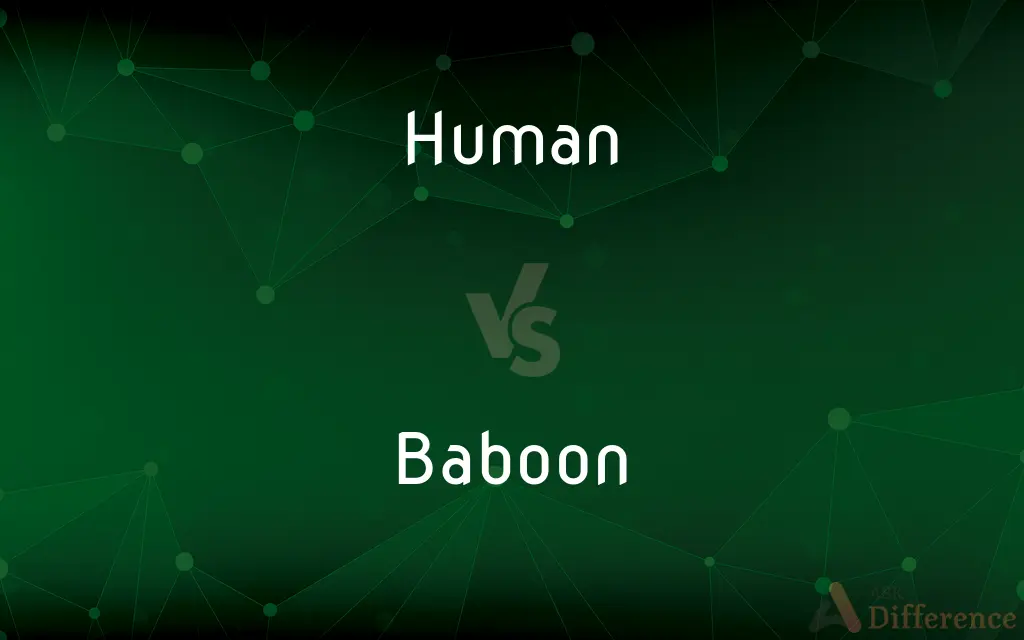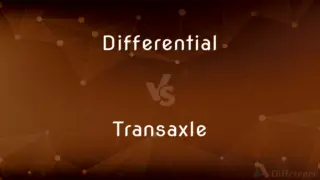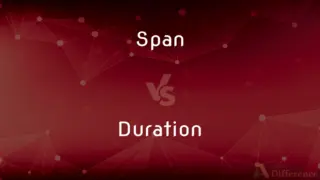Human vs. Baboon — What's the Difference?
By Urooj Arif & Fiza Rafique — Updated on May 9, 2024
Humans are highly evolved primates characterized by advanced cognitive abilities, language, and culture, while baboons are large, social monkeys known for their distinct snouts and behavior, primarily found in Africa.

Difference Between Human and Baboon
Table of Contents
ADVERTISEMENT
Key Differences
Humans are primates known for their sophisticated cognitive skills, enabling the creation of complex societies, language, and technology. On the other hand, baboons, as old-world monkeys, are less cognitively advanced but exhibit strong social structures and communication within their troops.
Humans are bipedal, walking upright on two legs, which allows them to manipulate tools with their hands. In contrast, baboons primarily walk on all fours and use their hands and feet for climbing and grasping.
Humans have a highly developed brain that supports reasoning, planning, and abstract thinking, while baboons have less developed brains focused on social interaction and environmental awareness.
Humans live in varied habitats across the globe and adapt through culture and technology. Baboons are mainly found in savannas, forests, and hills of Africa and adapt to their environment through behavioral changes.
Humans build complex civilizations and use written language, while baboons communicate through vocalizations, facial expressions, and body language, lacking symbolic representation or writing.
ADVERTISEMENT
Comparison Chart
Classification
Hominidae family (Great Apes)
Cercopithecidae family (Old World Monkeys)
Locomotion
Bipedal
Quadrupedal
Social Structure
Complex societies, cultures
Troops or groups
Brain Development
Highly advanced
Less developed, focusing on social aspects
Communication
Language and writing
Vocalizations and body language
Compare with Definitions
Human
A creature with unique artistic and technological abilities.
Humans express themselves through art, technology, and literature.
Baboon
A large primate with a long snout and sharp canines.
The baboon flashed its large teeth as a warning.
Human
An individual distinct from other animals.
Humans are unique in their use of symbolic language.
Baboon
A highly social animal that forms troops.
A troop of baboons groomed each other for bonding.
Human
A highly developed primate species.
Humans are capable of abstract reasoning and advanced problem-solving.
Baboon
A creature with strong social bonds and hierarchy.
In baboon societies, dominance hierarchies are established early.
Human
A member of the species Homo sapiens.
Humans have spread across every continent.
Baboon
An old-world monkey native to Africa.
Baboons are found in savannas and forests.
Human
A being with complex societies and cultures.
Humans are distinguished by their intricate social structures.
Baboon
An opportunistic feeder that adapts to human presence.
Baboons often forage near human settlements.
Human
Humans (Homo sapiens) are the most abundant and widespread species of primates, characterized by bipedality and large, complex brains enabling the development of advanced tools, culture and language. Humans are highly social beings and tend to live in complex social structures composed of many cooperating and competing groups, from families and kinship networks to political states.
Baboon
Baboons are primates comprising the genus Papio, one of the 23 genera of Old World monkeys. There are six species of baboon: the hamadryas baboon, the Guinea baboon, the olive baboon, the yellow baboon, the Kinda Baboon and the chacma baboon.
Human
Relating to or characteristic of humankind
The human body
The complex nature of the human mind
Baboon
Any of several large terrestrial African and Arabian monkeys of the genus Papio, having an elongated doglike muzzle and bare calluses on the buttocks.
Human
A human being.
Baboon
(Slang) A brutish person; a boor.
Human
A member of the primate genus Homo, especially a member of the species Homo sapiens, distinguished from other apes by a large brain and the capacity for speech.
Baboon
An Old World monkey of the genus Papio, having dog-like muzzles and large canine teeth, cheek pouches, a short tail, and naked callosities on the buttocks. 13
Human
A person
The extraordinary humans who explored Antarctica.
Baboon
A foolish or boorish person.
Human
Of, relating to, or characteristic of humans
The course of human events.
The human race.
Baboon
One of the Old World Quadrumana, of the genera Cynocephalus and Papio; the dog-faced ape. Baboons have dog-like muzzles and large canine teeth, cheek pouches, a short tail, and naked callosities on the buttocks. They are mostly African. See Mandrill, and Chacma, and Drill an ape.
Human
Having or showing those positive aspects of nature and character regarded as distinguishing humans from other animals
An act of human kindness.
Baboon
Large terrestrial monkeys having doglike muzzles
Human
Subject to or indicative of the weaknesses, imperfections, and fragility associated with humans
A mistake that shows he's only human.
Human frailty.
Human
Having the form of a human.
Human
Made up of humans
Formed a human bridge across the ice.
Human
(notcomp) Of or belonging to the species Homo sapiens or its closest relatives.
Human
(comparable) Having the nature or attributes of a human being.
To err is human; to forgive, divine.
Human
(narrowly) The tallest, most abundant and most intelligent of primates; Homo sapiens.
Humans share common ancestors with other apes.
Human
(broadly) Any hominid of the genus Homo.
Human
(rare) To behave as or become, or to cause to behave as or become, a human.
Human
Belonging to man or mankind; having the qualities or attributes of a man; of or pertaining to man or to the race of man; as, a human voice; human shape; human nature; human sacrifices.
To err is human; to forgive, divine.
Human
A human being.
Sprung of humans that inhabit earth.
We humans often find ourselves in strange position.
Human
A human being;
There was too much for one person to do
Human
Any living or extinct member of the family Hominidae
Human
Characteristic of humanity;
Human nature
Human
Relating to a person;
The experiment was conducted on 6 monkeys and 2 human subjects
Human
Having human form or attributes as opposed to those of animals or divine beings;
Human beings
The human body
Human kindness
Human frailty
Common Curiosities
Are humans and baboons part of the same primate family?
No, humans belong to the Hominidae family (great apes), while baboons are in the Cercopithecidae family (old-world monkeys).
Do humans and baboons live in the same environments?
Not typically; humans are global, while baboons are native to Africa.
Are humans bipedal, unlike baboons?
Yes, humans primarily walk upright, while baboons walk on all fours.
Do humans and baboons share any physical traits?
Yes, both have opposable thumbs and similar skeletal structures due to common primate ancestry.
Are baboons more aggressive than humans?
Not necessarily, but baboons can be aggressive in defending their territories.
Do baboons have cultures like humans?
Not to the same extent, but they do exhibit learned behaviors within their groups.
Do humans and baboons have similar diets?
Both are omnivorous, but humans have more varied diets due to agriculture.
Are baboons closely related to humans?
No, although both are primates, baboons are more distantly related to humans.
Do baboons display complex emotions like humans?
Baboons show emotions but not to the same complexity as humans.
Do humans and baboons use tools?
Yes, humans use tools extensively, and some baboon species also use simple tools.
Are baboons at risk due to human activities?
Yes, habitat destruction and hunting pose significant threats to baboons.
Are baboons capable of learning human behaviors?
Some behaviors, such as foraging near human settlements, can be learned.
Do humans and baboons communicate similarly?
No, humans use complex language, while baboons rely on vocalizations and body language.
Do humans and baboons form lifelong bonds?
Yes, both species form strong bonds within their groups.
Do humans and baboons have different lifespans?
Yes, humans have much longer lifespans than baboons.
Share Your Discovery

Previous Comparison
Differential vs. Transaxle
Next Comparison
Span vs. DurationAuthor Spotlight
Written by
Urooj ArifUrooj is a skilled content writer at Ask Difference, known for her exceptional ability to simplify complex topics into engaging and informative content. With a passion for research and a flair for clear, concise writing, she consistently delivers articles that resonate with our diverse audience.
Co-written by
Fiza RafiqueFiza Rafique is a skilled content writer at AskDifference.com, where she meticulously refines and enhances written pieces. Drawing from her vast editorial expertise, Fiza ensures clarity, accuracy, and precision in every article. Passionate about language, she continually seeks to elevate the quality of content for readers worldwide.











































